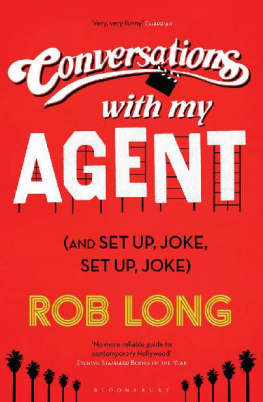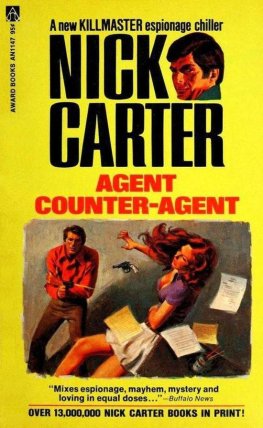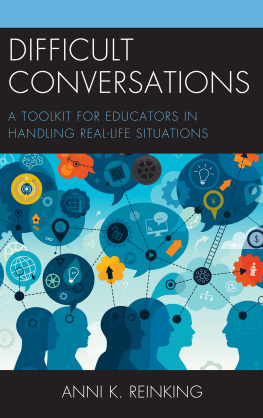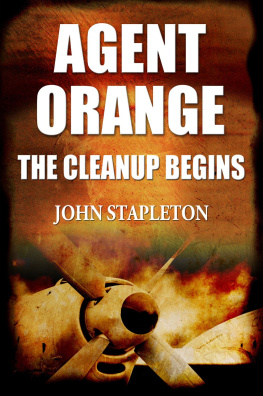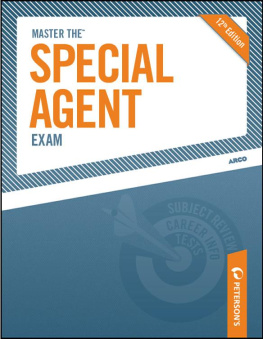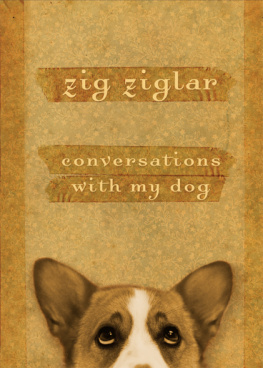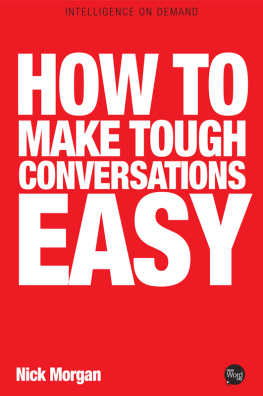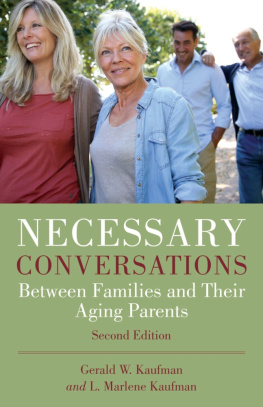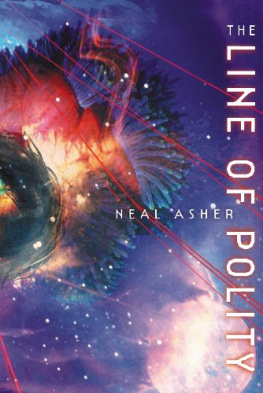Rob Long - Conversations with My Agent
Here you can read online Rob Long - Conversations with My Agent full text of the book (entire story) in english for free. Download pdf and epub, get meaning, cover and reviews about this ebook. year: 1997, publisher: Dutton Adult, genre: Non-fiction / History. Description of the work, (preface) as well as reviews are available. Best literature library LitArk.com created for fans of good reading and offers a wide selection of genres:
Romance novel
Science fiction
Adventure
Detective
Science
History
Home and family
Prose
Art
Politics
Computer
Non-fiction
Religion
Business
Children
Humor
Choose a favorite category and find really read worthwhile books. Enjoy immersion in the world of imagination, feel the emotions of the characters or learn something new for yourself, make an fascinating discovery.
- Book:Conversations with My Agent
- Author:
- Publisher:Dutton Adult
- Genre:
- Year:1997
- Rating:4 / 5
- Favourites:Add to favourites
- Your mark:
- 80
- 1
- 2
- 3
- 4
- 5
Conversations with My Agent: summary, description and annotation
We offer to read an annotation, description, summary or preface (depends on what the author of the book "Conversations with My Agent" wrote himself). If you haven't found the necessary information about the book — write in the comments, we will try to find it.
Rob Long: author's other books
Who wrote Conversations with My Agent? Find out the surname, the name of the author of the book and a list of all author's works by series.
Conversations with My Agent — read online for free the complete book (whole text) full work
Below is the text of the book, divided by pages. System saving the place of the last page read, allows you to conveniently read the book "Conversations with My Agent" online for free, without having to search again every time where you left off. Put a bookmark, and you can go to the page where you finished reading at any time.
Font size:
Interval:
Bookmark:

To my parents
This book is half true.
(And so is the one right after it.)
To the reader:
The first book in this two-book compilation, Conversations with My Agent , was published in 1996. That should depress me, I suppose that was a long time ago, and I was a young man then but on the other hand, in those days writing a book was pretty much the only way to tell a personal story. If I were to start today, Id probably fritter all of this material away in a series of Tweets or blog posts or status updates or some other form of non-remunerative writing. Thats Rule One of being a professional writer: never write anything for free.
About ten years later, I published the second book, Set Up, Joke, Set Up, Joke . Its essentially the same story, just darker and older and slightly more impressionistic. Thats Rule Two of being a professional writer: if youre going to tell the same story twice, make sure you punch it up.
Now, ten years after the second book was published, theyre both being published together. My plan is to split them up again in ten years and begin the cycle again, creating the illusion of productivity but in fact doing as little writing as possible.
And thats Rule Three.
Contents
Fade in: Spring 1993
I am a co-executive producer of the long-running, phenomenally successful television series Cheers . My writing partner, Dan Staley, and I have risen rapidly through the staff-writing ranks since 1990, when we drove on to the Paramount Studios lot in my decrepit rust-heap of a ten-year-old Subaru (bought in New Hampshire for $800; 72,340 miles on the odometer; strange, acrid/sweet smell wafting from the front end during left turns) and began our careers in television. I am a know-it-all twenty-seven-year-old and, from my tiny mountaintop, two years working on Cheers meant a lifetime. A career. Cheers , the IBM of television shows.
Last December, Ted Danson, star of the show, meal-ticket for hundreds (including me), the man who portrayed Sam Malone rogue bartender, ladies man, athlete decides, What the hell, time to move on.
So I do what you do when you work in Hollywood and something bad happens. I call my agent. An hour or two later, my agent calls back.
CUT TO:
INT. LUCILLE BALL BUILDING, PARAMOUNT STUDIOS DAY
MY AGENT ( over phone ) What do you want?
ME You called me.
MY AGENT I did?
Pause .
SFX: papers rattling .
Oh yeah. Listen, the shows not coming back.
ME I know.
MY AGENT I know you know. I was just reiterating for convenience. Listen, you and Dan are in a good position right now. Theres a lot of heat on [ my agent mentions a famous Hollywood actor ] to do a series with you guys at the helm. Theres just one fly in the ointment, but otherwise, you guys should take the meeting.
ME Whats the fly in the ointment?
MY AGENT What are you talking about?
ME You said that theres a fly in the ointment.
MY AGENT Theres no fly in the ointment.
ME But you just said
MY AGENT The fly in the ointment is that they need a script by the end of the month.
ME Its the nineteenth.
MY AGENT I think your obsession with dates is unhealthy.
ME Hmmmmm.
MY AGENT This is grownup time, boys. Its a cold world out there. Cheers is fini . Think it over.
SFX: click, dial tone .
CUT TO:
A few months later, the script is unwritten, the famous Hollywood actors interest in us and television is history, and we are contemplating signing a development deal with a large studio. Another conversation with my agent this one in person .
CUT TO:
EXT. PATIO, ORSOS RESTAURANT DAY
MY AGENT Good news. Youve got a pilot commitment from the network.
ME Wow. Great! What does that mean?
MY AGENT Nothing.
ME So why is it good news?
Beat. Rolling eyes in my direction. A Why-do-I have-to-put-up-with-this take to the waiter .
MY AGENT Its good news because it means youre a player. It means that when you approach the studio for an overall deal, you have something to bring to the party. You can bargain from a position of strength.
ME Great! Does that mean more money?
MY AGENT Definitely not. Youre in a very weak position.
ME But I thought you said
MY AGENT Look, its not 1989, okay? Theres no development money around. Its 19-fucking93. Everythings different. I mean, my God, theres no Berlin Wall anymore. Do you want to turn back the clock? Is that it?
ME But I thought you said
MY AGENT Things are tough. What I said was, Things are tough .
CUT TO:
A development deal is one of those entertainment industry creations that, when described, sound suspiciously like goofing off. Essentially, the studio agrees to pay a writer a minimum sum, over two years, in the hope that the writer, once the novelty of being paid good money sometimes, great money to do absolutely nothing but sit and think wears off, will become so thoroughly disgusted with a workday that begins at eleven in the morning and ends roughly after lunch that he just decides, What the hell, I may as well create a hit television show.
The reason these deals last two years is that it takes at least one year for the writer to become tired of moseying into the office at eleven and skulking out at one-thirty. Or so Im told. My personal mission, over the next two years, is to test that particular old wives tale.
The development deal was signed in March 1993 and would take effect on 1 June. Signed, of course, is a not quite accurate term. No piece of paper was actually produced, you see; no contract drawn up. In Hollywood, written that is to say, legally binding contracts are thought vulgar. In fact, just asking for a written contract is apt to bring out the latent Mafiosi in Industry denizens. Im giving you my word, their pained expressions seem to say. What? You dont trust me?
And besides, the actual document thirty pages long, perhaps, and cast in language sadistically designed to render generally accepted accounting phrases like profit, loss and guarantee into numerically impossible, insurmountable and yeah, right is a sheaf of papers that will be tied up in dense, expensive legal wrangling for the duration of the two-year term of the deal itself. And since almost all of the wrangling centers around what the colorful phrasemakers who run things in this town like to call the back end (i.e. syndication money, overseas sales, reruns, spin-offs, video games, toys, whatever), and since any back end money is way, way, way in the fuzzy distance, theres no particular rush to settle the issues once and for all, certainly not for the lawyers, who have second houses to buy and childrens tuition to pay for. So the back end just sits there, waiting. The two schools of thought among writers are, one, No matter what, dont let the studio screw you in the back end ; and two, Hey, you may not have a back end at all, so tell the studio, if you pay me a lot of money now, Ill let you screw me in the back end .
So one settles for a deal memo one sheet of paper that lists the key elements of the deal: money, title, office requirements, parking (Im serious) and a secretary. In short, the five pillars of happiness for the 818, 213 and 310 telephone area codes.
In fact, the only problem with a development deal is that almost everyone in Hollywood has one. That kind of mitigates its prestige. There is even a sardonic term for it, development hell, which refers to the endless round of meetings and adjustments that the studio or the network (or, worst-case scenario, the studio and the network) demand of ones original script or idea. Since theyve got you for two years, they reckon, they may as well stretch every decision out exactly that long. Thus follows one of the Industrys most immutable rules: time constraints due to star availability, network time slots, opening dates, whatever always work in the writers favor. The less time you have, the less meddlesome the studio and networks can be. Sadly, the reverse is also true.
Next pageFont size:
Interval:
Bookmark:
Similar books «Conversations with My Agent»
Look at similar books to Conversations with My Agent. We have selected literature similar in name and meaning in the hope of providing readers with more options to find new, interesting, not yet read works.
Discussion, reviews of the book Conversations with My Agent and just readers' own opinions. Leave your comments, write what you think about the work, its meaning or the main characters. Specify what exactly you liked and what you didn't like, and why you think so.

